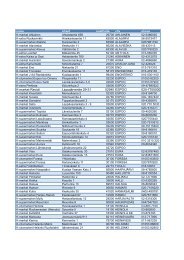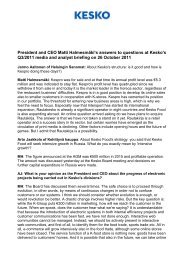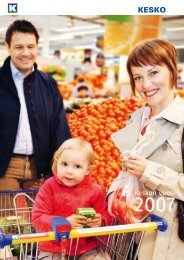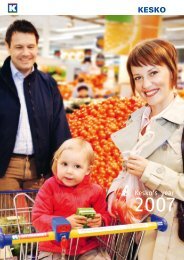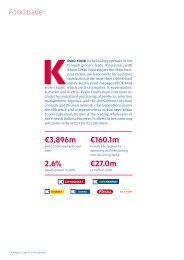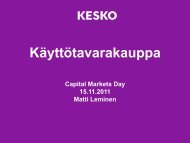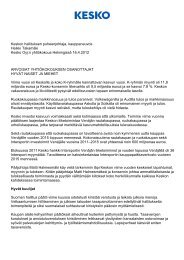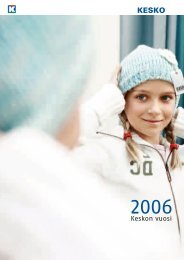Pdf version (3.2 MB) - Kesko
Pdf version (3.2 MB) - Kesko
Pdf version (3.2 MB) - Kesko
Create successful ePaper yourself
Turn your PDF publications into a flip-book with our unique Google optimized e-Paper software.
the rating for gender equality is 4.11 (4.02) (on a scale of 1–5), age<br />
equality 4.07 (4.00) and ethnic equality 4.19 (4.12).<br />
At year-end, 60% (61%) of the <strong>Kesko</strong> Group employees in Finland<br />
were female and 40% (39%) were male. In foreign companies, the<br />
figures were 44% and 56% (46% and 54%) respectively. The figure<br />
for 2011 does not include data for Konsoma Belarus.<br />
In 2011, one of the seven members of the <strong>Kesko</strong> Board, and two<br />
of the eight members of the Corporate Management Board were<br />
women. Since 1 December 2011, the Corporate Management Board<br />
has had four female members.<br />
In the retail subsidiaries in Finland, a significant percentage of<br />
supervisory positions are held by women. 81% (82%) of K-citymarket<br />
home and speciality goods’ department managers and 69% (69%)<br />
of Anttila department stores’ department managers are women.<br />
RATIO OF BASIC SALARy OF MEN TO WOMEN, LA14<br />
The average annual salary of <strong>Kesko</strong> employees was €34,534 in<br />
Finland, €34,777 in the other Nordic countries, and €9,613 in the<br />
Baltic countries, Russia and Belarus (OOO Johaston is included). As<br />
the <strong>Kesko</strong> Group’ operates in many lines of business, average salary<br />
is not a good indicator of salary level or structure.<br />
The wage groups and tables specified in the collective trading<br />
sector labour agreement are applied to jobs covered by the agreement,<br />
such as sales assistants and warehouse workers. Salaries are<br />
affected by job-based responsibility bonuses, work experience and<br />
the cost-of-living category which depends on the locality. Besides<br />
the role and job requirements, the salary of a senior white-collar<br />
employee is determined by competence, work experience, performance<br />
and results. Because of the diversity of job descriptions, it<br />
is not possible to comprehensively compare the salaries between<br />
genders at the Group level.<br />
Equality in compensation is considered as part of annual company-specific<br />
equality plans. Gender is not a factor in determining<br />
pay levels, and no significant differences in comparable jobs have<br />
been detected. Company-specific equality plans strive to promote<br />
pay equality in jobs where comparisons can be made.<br />
sOCIal REsPONsIBILITy<br />
Human rights issues in <strong>Kesko</strong>'s purchasing chain<br />
In its operations, <strong>Kesko</strong> pays special attention to the human rights<br />
issues and working conditions in its purchasing chain and focuses<br />
its monitoring efforts primarily on suppliers operating in the highrisk<br />
countries. Read about supply chain control on page 56.<br />
High-risk countries typically produce clothing and home textiles,<br />
shoes and other leather goods, furniture, carpets, interior decoration<br />
products, sports equipment, toys, agricultural products (such<br />
as coffee, tea, cocoa, fruit, vegetables, wines), and canned fish, fruit<br />
and vegetables.<br />
In 2011, direct purchases by <strong>Kesko</strong>’s Finnish companies from suppliers<br />
in the high-risk regions totalled €143 million (€114 million in<br />
2010), which is 1.8% (1.5%) of <strong>Kesko</strong>’s total purchases. Direct imports<br />
from high-risk countries accounted for 25.6% (18.2%) of <strong>Kesko</strong>'s total<br />
imports to Finland. No statistics are available on direct imports from<br />
the high-risk countries by <strong>Kesko</strong>'s subsidiaries in other countries,<br />
but <strong>Kesko</strong>'s purchases in 2011 analysed by company's country of<br />
domicile and by supplier's country of domicile also include purchases<br />
from high-risk countries at a total value of €237 million (€203<br />
million), or 2.9% (2.7%) of <strong>Kesko</strong>'s total purchases. Approximately<br />
72% (82%) of <strong>Kesko</strong>'s imports to Finland (excluding imports by VV-<br />
Auto) comes from other EU countries.<br />
In addition to its own direct imports, <strong>Kesko</strong> also purchases goods<br />
produced in high-risk countries from other importers operating in<br />
Finland and through international purchasing groups. There are<br />
no reliable statistics available on the countries of origin of these<br />
imports, which mainly consist of international branded goods that<br />
have been the subject of much attention in respect of assuring the<br />
responsibility of their production in recent years. There may also<br />
be social risks involved in the manufacture of products imported<br />
to Finland through third countries or in the production of their<br />
ingredients.<br />
Ethical purchasing principles and the Steering Group for<br />
Responsible Purchasing<br />
Responsible purchasing is guided by <strong>Kesko</strong>'s ethical purchasing<br />
principles, which are available at www.kesko.fi/responsibility. The<br />
principles are based on the national labour protection legislation<br />
and corresponding conventions of the International Labour Organization<br />
(ILO), applied when national legislation does not impose<br />
equally hihg standards.<br />
<strong>Kesko</strong> has a steering group for responsible purchasing, which<br />
steers and coordinates social quality control of suppliers. The group<br />
consists of representatives of <strong>Kesko</strong>'s division parent companies<br />
importing from high-risk countries. The steering group met three<br />
times in 2011 and focused on purchasing policies, BSCI Committee<br />
work, BSCI audits and related annual objectives.<br />
Monitoring human rights and working conditions in the<br />
purchasing chain<br />
<strong>Kesko</strong> is a member in the European BSCI audit system, and uses<br />
the BSCI audits and the SA8000 standard for assessing its suppliers<br />
in high-risk countries. As a member of the BSCI, <strong>Kesko</strong> sets annual<br />
targets for the number of audits to be conducted in suppliers' factories<br />
in the high-risk countries. The objective is also to improve the<br />
quality of audit results.<br />
In cooperation with BSCI, <strong>Kesko</strong> follows other audit systems in<br />
the market and accepts audits based on them, provided that the level<br />
of requirements is the same as in the BSCI audit. <strong>Kesko</strong> accepts ETI,<br />
WIETA and UTZ audits as compliant with its sourcing practices, and<br />
other audits systems are assessed on a case-by-case basis. The table<br />
on page 87 presents some certification and audit systems which are<br />
applied to different product groups in <strong>Kesko</strong>.<br />
<strong>Kesko</strong> Corporate Responsibility Report 2011 85



